
eBook - ePub
The Life of a Private
Journals of a U.S. Private of World War 1
Jason Sprague (Produced by Samuel Sprague)
This is a test
Condividi libro
- 66 pagine
- English
- ePUB (disponibile sull'app)
- Disponibile su iOS e Android
eBook - ePub
The Life of a Private
Journals of a U.S. Private of World War 1
Jason Sprague (Produced by Samuel Sprague)
Dettagli del libro
Anteprima del libro
Indice dei contenuti
Citazioni
Informazioni sul libro
A firsthand account written in the final year of World War I. Jason Sprague recounts his experience as a private in the United States military. Sprague presents his adjustment from a serene life in the states to the battle-ravaged fields and confusion of Europe during "the war to end all wars" from the explosion of the Spanish flu, the signing of the armistice, and the aftermath of the Argonne Forest offensive. Including images he took himself or collected along the way, he details his journey from his landing in France as he joins his company on the march towards Germany. The detailed stories provided offer a unique perspective to even those who are experts of this historical conflict.
Domande frequenti
Come faccio ad annullare l'abbonamento?
È semplicissimo: basta accedere alla sezione Account nelle Impostazioni e cliccare su "Annulla abbonamento". Dopo la cancellazione, l'abbonamento rimarrà attivo per il periodo rimanente già pagato. Per maggiori informazioni, clicca qui
È possibile scaricare libri? Se sì, come?
Al momento è possibile scaricare tramite l'app tutti i nostri libri ePub mobile-friendly. Anche la maggior parte dei nostri PDF è scaricabile e stiamo lavorando per rendere disponibile quanto prima il download di tutti gli altri file. Per maggiori informazioni, clicca qui
Che differenza c'è tra i piani?
Entrambi i piani ti danno accesso illimitato alla libreria e a tutte le funzionalità di Perlego. Le uniche differenze sono il prezzo e il periodo di abbonamento: con il piano annuale risparmierai circa il 30% rispetto a 12 rate con quello mensile.
Cos'è Perlego?
Perlego è un servizio di abbonamento a testi accademici, che ti permette di accedere a un'intera libreria online a un prezzo inferiore rispetto a quello che pagheresti per acquistare un singolo libro al mese. Con oltre 1 milione di testi suddivisi in più di 1.000 categorie, troverai sicuramente ciò che fa per te! Per maggiori informazioni, clicca qui.
Perlego supporta la sintesi vocale?
Cerca l'icona Sintesi vocale nel prossimo libro che leggerai per verificare se è possibile riprodurre l'audio. Questo strumento permette di leggere il testo a voce alta, evidenziandolo man mano che la lettura procede. Puoi aumentare o diminuire la velocità della sintesi vocale, oppure sospendere la riproduzione. Per maggiori informazioni, clicca qui.
The Life of a Private è disponibile online in formato PDF/ePub?
Sì, puoi accedere a The Life of a Private di Jason Sprague (Produced by Samuel Sprague) in formato PDF e/o ePub, così come ad altri libri molto apprezzati nelle sezioni relative a History e North American History. Scopri oltre 1 milione di libri disponibili nel nostro catalogo.
Informazioni
Argomento
HistoryCategoria
North American HistoryChapter 1
Flu and in France
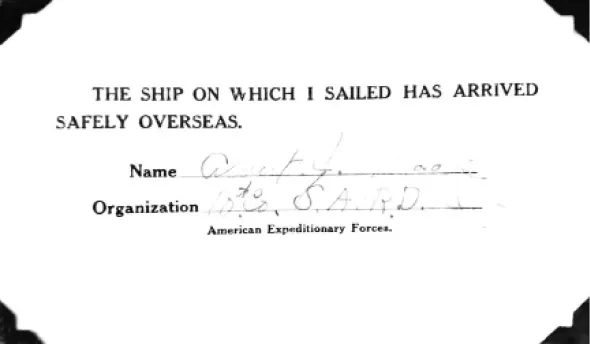
In September 23 at about ten o’clock, we started out of the harbor for France. We saw our last sight of the Statue of Liberty on that date. For the first few hours or day, our minds were occupied with the sensation of being on the ocean. There were several airplanes and dirigibles followed us for quite away, scouting for submarines. From New York, we went southeast and joined another convoy from Newport News. Our convoy then consisted of seven transports, two or three battleships, quite a few submarine chasers, and destroyers. A day or so out, one boat fired at a floating barrel mistaken for a periscope of a submarine. Of course, that caused quite an excitement among the soldiers. As there was something like 45,000, but in an instant, all was prepared for battle. They discovered the mistake before another shot was fired. Saw some flying fish, some sharks, and other reptiles that we didn’t know what they were. All right then, until the alarm was sounded for battle array. Far away off to the south was a little sailboat. We could not see it with the naked eye for several hours. The sailors told us. Then in time, it came in plain view to all. The transports were all arranged in kind of a corral-like shape and one battleship straight out toward the little sailboat. Thinking perhaps it might be a camouflage for some submarine, hidden away or to come up on the other side somewhere, when their attention was drawn away. This was the south coast to Spain. So they told us all went well.
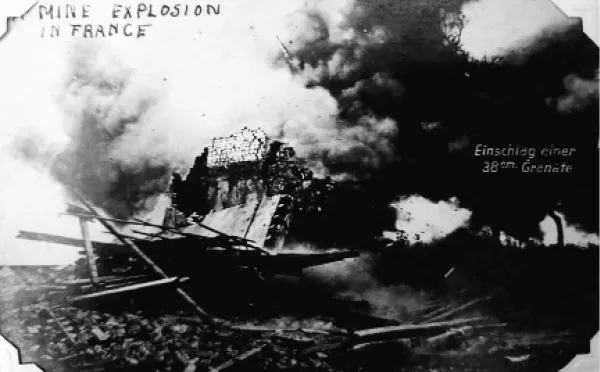
Then the Spanish influenza struck us a few days before we landed or about a week later. We lost upwards of 150 men from the “flu” on our boat alone. I had the “flu” sickness and the blues together but managed to recover—having only a light case. One or more of the Doniphan boys died on the boat, and quite a few went to the hospital. It was a dreadful sight to see the poor boys buried at the sea. They would tie weights to them and sow them up in kindly blankets like and let them then slide down a chute into the sea. One day, as high as thirty men were buried: fifteen in the morning and fifteen in the evening. The military band played the burial hymns. After fourteen days on the sea, we came into the port and harbor at Saint-Nazaire, France, seeing the shore quite a distance away. It looked just like a picture. I saw this in geography several years before: the old-time windmill, houses, etc. Due to the size of the boat, we could not get into the port. We had to wait until the tide came up. Next day, Sunday, we anchored in the harbor. We stayed there. Our company was on guard duty aboard the boat. Then they called us off duty as everybody had to prepare to get off or unload rather. This is where I almost got caught asleep on guard duty. Also I kept New York time, but I broke my watch the last day on board the boat. Well, after we got to the dock, I saw my first German prisoners. They worked close to the landing, but very closely guarded. I thought they were worth looking at. I wondered at them and the thoughts I was taught about them. They were so bad, reckless, and several other ways. It almost made one think they were wild men by the rumors. This is what made them so interesting. As quickly as possible, we arranged and unloaded. This was on the seventh day of October 1918.
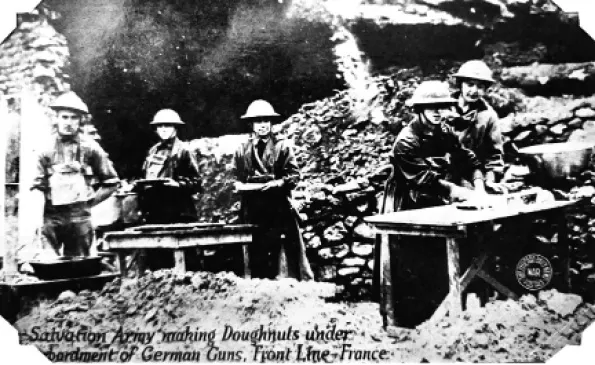
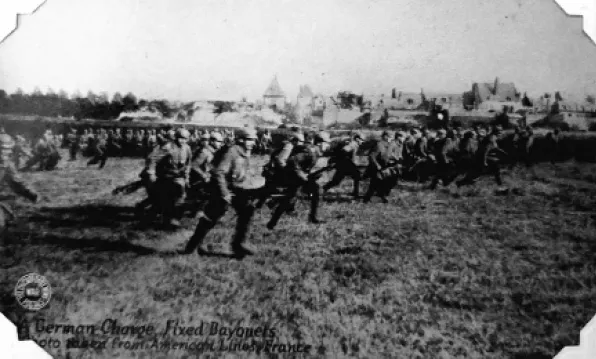
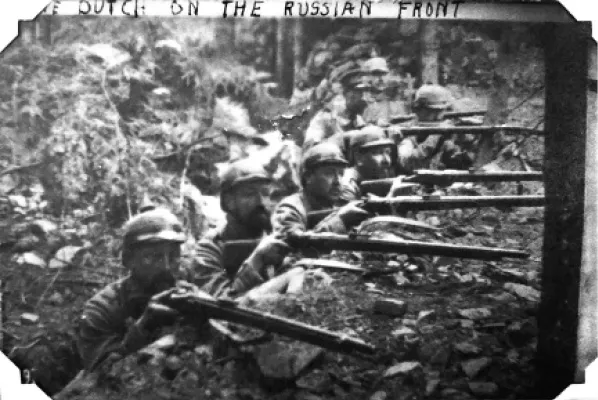
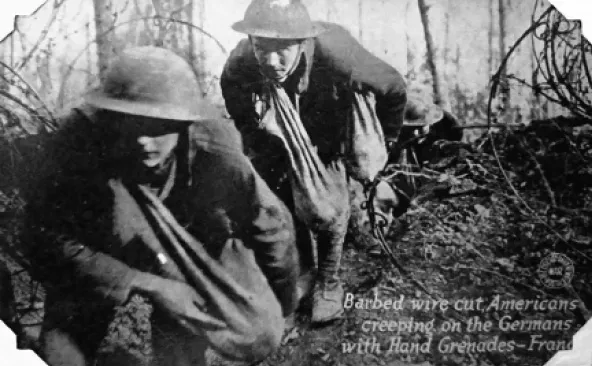
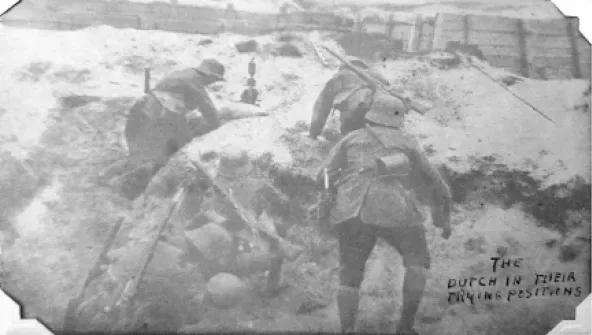
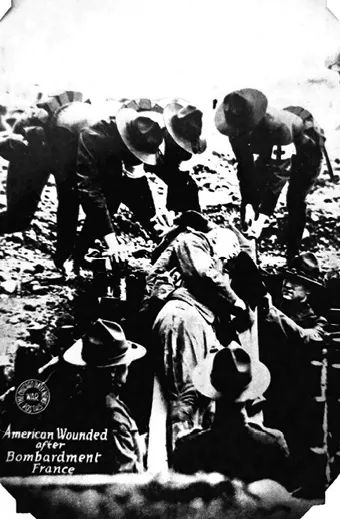
October 1918
We were then forced to walk and carry our packs again—a distance of two miles. Weak, most of us were all given out and then had to put up our little tents. Before eating supper, we had to walk about one kilometer to get a few beans, bread, and coffee. A kilometer, they say about five-eighths of a mile. We camped right on the seacoast, and it rained. I think almost every day and night, making it so damp and wet. No one could feel good. I never felt good while here.
Well, we didn’t do much drilling here. Only a little skirmish drill and practice hikes. The inspections, we had them. They detailed us quite often to work on the remount station. They were putting in, but the saying is we worked on nothing. For they fed us mighty poor, getting nothing but a little black coffee and a little bacon, one slice of bread, and a potato or two with the jacket on. I was lucky at having a good partner, Lemore Snodgrass of Gatewood. We helped each other along the eating line, and more than once we’ve eaten after dark down on the coast somewhere. We soon had an agreement that if one of us made seconds and the other didn’t, the lucky one was to divide. I’ve thrown my rifle many times at night from the tent door to the old bunk in order to get into the mess line first. I had my mess kit already tied on to my clothing, prepared if I or Lemore would make it first quick. We would hide it under our blankets, and out again we’d go. I’ve gone through the line, around as high as four times, then didn’t get nothing like I or all I could eat. One night Lemore and I were arrested and tried by kangaroo court. My charge was trying to beat the mess line. He was gambling on the company street. We pleaded not guilty. My case was dismissed, but he got detailed work next day, Sunday. One cook was caught trading our eatables away for wine to the French women. He was given thirty days hard labor and not allowed to go in the kitchens, but I think he ought to had more for he made us all supper just for his own good. Before leaving the states, we heard the US Army had enough food over there to last three months. It was our opinion now that they were going to keep it for we weren’t getting any of it.
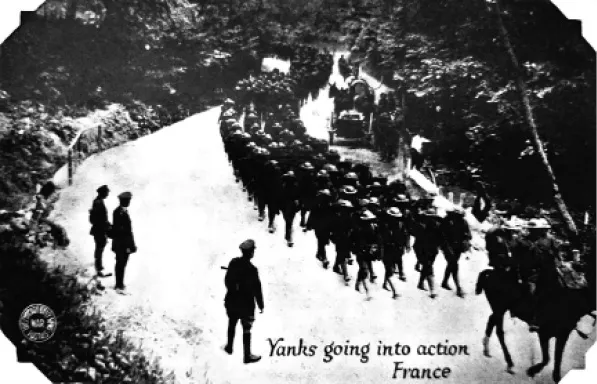
Quite a few incidents occurred while we were at this camp. One night, a yelling broke out over camp, and I never heard the like. It was a continuous roar. There was almost a rumor that peace had been signed or rather the armistice, but it proved a failure as do all rumors the last week. We stayed here we got the big squad tents, and they were so much better than the little ones for them you had to stoop down to crawl into mud and water right at the door.
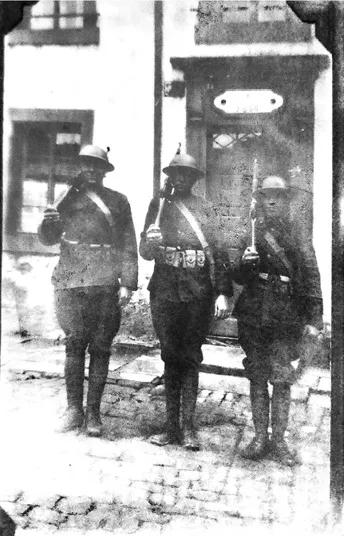
The city of Saint-Nazaire is very interesting place, being on the coast and at the mouth of a river, but it isn’t much of a port for the ocean-going vessels. Bicycles and wheel barrels are the chief way of street traffic. You’ll hardly ever saw an automobile except an American car used by the Army officers, and the streets of the city were very dirty. Also most of the buildings were two or more stories high. All walled in except in the right of the town. Well, about three weeks here and orders came. We were to move on through France. So packing up one evening, we hiked back to the city, down the main street, and to the railroad where the jolly old boxcars were awaiting us. They loaded thirty men in a car. We had enough bully beef and hard tack to last two or three days—the authorities thought so. But we could have eaten it at once if allowed. The boxcars were about half as big as the A...